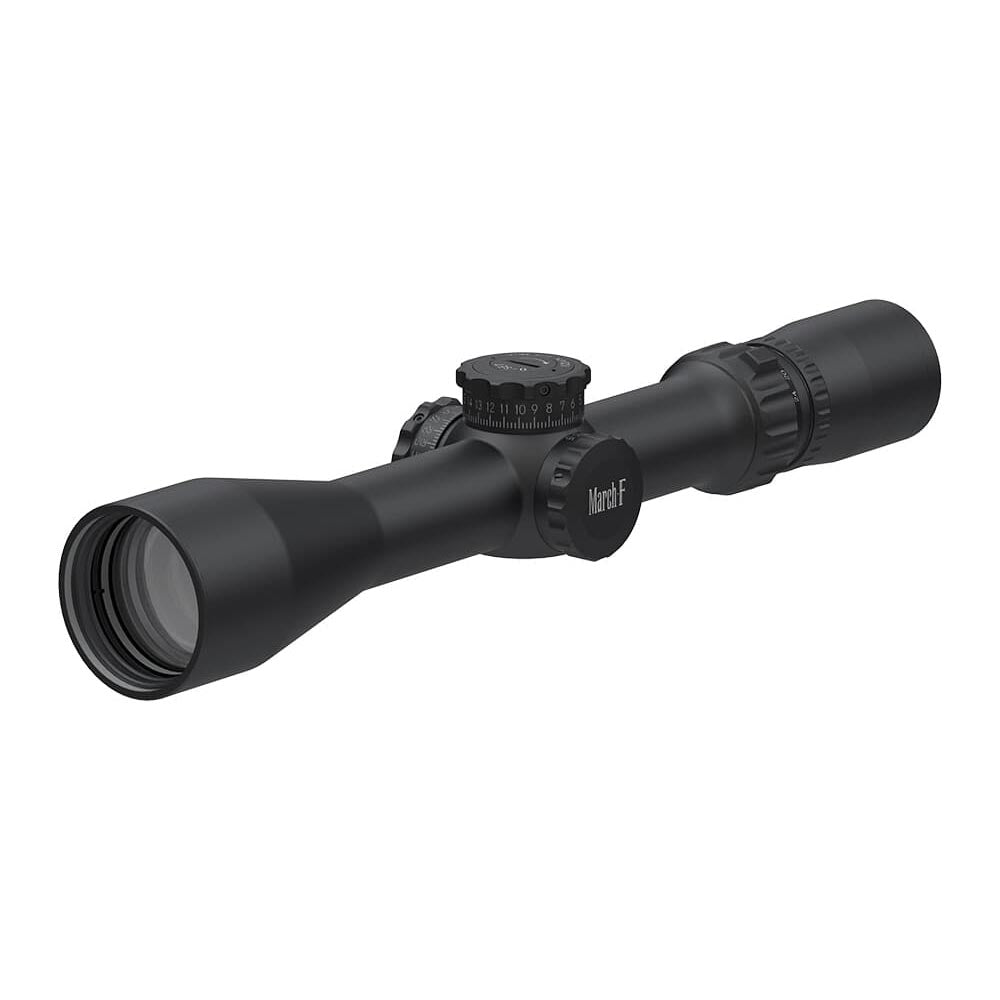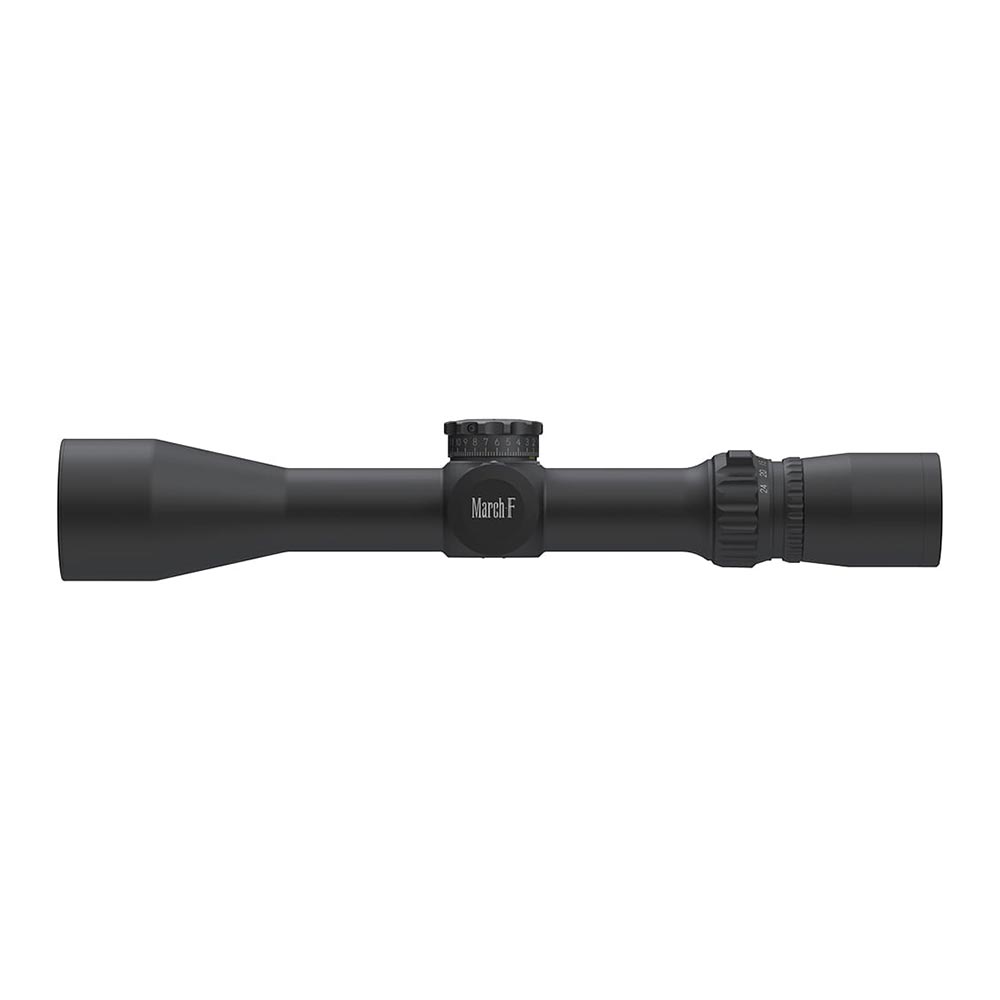Description
The March-F Tactical 3-24x42 FMA-2 Reticle 1/4MOA FFP Riflescope offers precision and versatility for both competitive shooters and tactical applications. It features a 42mm objective lens constructed from extra low dispersion optical glass, ensuring clarity and brightness in various lighting conditions. The first focal plane design enables accurate reticle subtensions across the entire magnification range, enhancing target acquisition at any distance. With tactical exposed turrets for windage and elevation adjustments, the riflescope ensures precise, repeatable settings, making it ideal for demanding shooting scenarios.
This riflescope is built for rugged use, boasting a lightweight yet durable construction. The side parallax adjustment ranges from 10 yards to infinity, allowing for fine-tuning based on your shooting environment. The FMA-2 reticle provides clear aiming points, enhancing accuracy without clutter. Whether for long-range hunting or competitive shooting, the March-F Tactical 3-24x42 ensures optimal performance and reliability.
Features – Key Benefits Bullets
- FIRST FOCAL PLANE (FFP) for accurate subtensions at all magnifications.
- EXTRA LOW DISPERSION GLASS enhances clarity and brightness in low-light conditions.
- TACTICAL EXPOSED TURRETS allow quick adjustments for windage and elevation.
- LIGHTWEIGHT DESIGN makes it easy to carry without compromising durability.
- PARALLAX ADJUSTMENT from 10 yards to infinity for precise focusing.
- RUGGED CONSTRUCTION ensures reliability in extreme conditions.
- FMA-2 RETICLE offers clear aiming points without clutter.
- WATERPROOF AND FOG-PROOF for dependable performance in various environments.
Technical Specifications
| Specification | Details |
|---|---|
| Magnification | 3-24x |
| Objective Lens Diameter | 42mm |
| Eye Relief | 3.35 - 3.94 in |
| Length | 12.28 in |
| Weight | 21.52 oz |
| Reticle Type | FMA-2 |
| Turret Adjustment | 1/4 MOA |
| Waterproof/Fog-proof | Yes |
What's in the Box?
- March-F Tactical 3-24x42 FMA-2 Reticle Riflescope
- Lens covers
- Padded case
- Neck strap
Customer Reviews
"Exceptional clarity and ease of use. Perfect for long-range shooting!"
"The turrets are very responsive. I love the FFP feature for competitive shooting."
"Lightweight yet durable. It has exceeded my expectations in the field."
FAQ
What is the advantage of a first focal plane reticle? A first focal plane reticle maintains its size relative to the target at all magnifications, allowing for accurate range estimation and holdovers at any zoom level.
How do I maintain my riflescope? Regularly check for any dirt or debris on the lenses. Use a soft, clean cloth to gently wipe the lenses. Store the scope in a dry place to prevent moisture buildup.
How does this compare to other tactical scopes? The March-F Tactical scope offers superior optical clarity and adjustable turrets, making it stand out among tactical scopes designed for precision shooting. It also features a lightweight design without sacrificing durability.
Similar Models
Looking for more options? Explore our range of March Tactical scopes, including the March-F 4-32x50 and March-F 5-40x56, designed to meet the needs of competitive shooters and tactical users alike. Browse our full collection for the perfect fit for your shooting requirements.
Our Guarantees
FREE Fast Shipping Over $99
Enjoy complimentary expedited shipping on all orders over $99.
Secure Payments
Shop with confidence using our encrypted payment processing.
High Quality or Money Back
Not satisfied with your purchase? We'll refund your money, no questions asked.
Top-Notch Support
Our expert team is available to answer all your questions and provide assistance.
What Our Customers Say
Optics Knowledge Center
Understanding Rifle Scope Basics
Magnification
Magnification refers to how much larger an object appears through the scope compared to the naked eye. Fixed power scopes have one magnification setting, while variable power scopes offer a range (e.g., 3-9x).
Objective Lens
The objective lens is the front lens that gathers light. Larger objective lenses (measured in mm) gather more light, providing brighter images in low-light conditions but add weight and require higher mounting.
Reticle
The reticle (crosshair) is the aiming point inside the scope. Modern scopes offer various reticle designs, from simple duplex crosshairs to complex ballistic reticles with holdover points for different distances.
Adjustments
Rifle scopes have turrets for windage (horizontal) and elevation (vertical) adjustments. These are measured in MOA (minutes of angle) or MRAD (milliradians) and allow precise aiming adjustments.
Proper Scope Mounting Guide
Select the Right Rings & Base
Choose rings that match your scope's tube diameter (typically 1", 30mm, or 34mm). Select a base compatible with your rifle's receiver. For heavy-recoiling rifles, opt for stronger mounts.
Install the Base
Clean the receiver and base thoroughly. Apply a small amount of blue Loctite to the screws. Attach the base to the receiver and torque the screws to manufacturer specifications.
Attach the Rings
Attach the bottom halves of the rings to the base. Place the scope in the rings and loosely attach the top halves. Don't fully tighten yet.
Set Eye Relief & Level
Position the scope for proper eye relief (3-4 inches) in your normal shooting position. Ensure the reticle is level using a scope leveling tool. Once positioned correctly, tighten the rings evenly in a cross-pattern.
Scope Zeroing Tips
Start Close
Begin zeroing at a shorter distance (25-50 yards) to ensure you're on paper before moving to your desired zero distance (typically 100 yards).
Use a Stable Rest
Always zero your rifle from a stable shooting position using a bench rest, sandbags, or a shooting rest to eliminate as much human error as possible.
Fire Groups
Fire 3-shot groups before making adjustments. This provides a more accurate representation of where your rifle is shooting than single shots.
Make Deliberate Adjustments
Know your scope's adjustment values (typically 1/4 MOA per click). If your group is 2 inches low at 100 yards, you'll need to adjust up 8 clicks (for a 1/4 MOA scope).
Confirm Your Zero
After making adjustments, fire another group to confirm your zero. Repeat the process until your point of impact matches your point of aim.
Document Your Settings
Once zeroed, record your settings including distance, ammunition used, and environmental conditions for future reference.
Optics Maintenance & Care
Cleaning Lenses
- Start by blowing or brushing away loose particles
- Use a lens pen or microfiber cloth for fingerprints
- For stubborn dirt, use lens cleaning solution (never household cleaners)
- Clean with gentle circular motions from center outward
Protecting Your Optics
- Always use lens caps when not in use
- Store in a dry place with silica gel packets
- Avoid extreme temperature changes
- Use a quality scope cover in harsh conditions
Regular Maintenance
- Check and tighten mount screws periodically
- Inspect O-rings and seals for damage
- Verify zero after rough handling
- Clean the exterior with a damp cloth
What to Avoid
- Never use fingers to touch lenses
- Avoid paper products (tissues, paper towels) on lenses
- Don't use acetone, alcohol, or household cleaners
- Never disassemble your scope (voids warranty)



